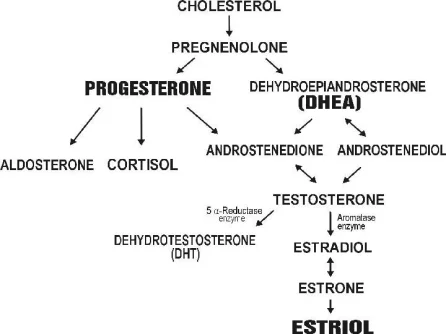Nelson Vergel
Founder, ExcelMale.com
Once again, an excellent article from Anabolic.org
Glucose Utilization and Estrogen
Estrogen may play a very important role in the promotion of an anabolic state by affecting glucose utilization in muscle tissue. This occurs via an altering of the level of available glucose 6-phosphate dehydrogenase, an enzyme directly tied to the use of glucose for muscle tissue growth and recuperation
Estrogen and GH/IGF-1
Estrogen may also play an important role in the production of growth hormone and IGF-1. IGF-1 (insulin-like growth factor) is an anabolic hormone released in the liver and various peripheral tissues via the stimulus of growth hormone (See Drug Profiles: Growth Hormone). IGF-1 is responsible for the anabolic activity of growth hormone such as increased nitrogen retention/protein synthesis and cell hyperplasia (proliferation).
Estrogen and the Androgen Receptor
It has also been demonstrated that estrogen can increase the concentration of androgen receptors in certain tissues. This was shown in studies with rats, which looked at the effects of estrogen on cellular androgen receptors in animals that underwent orchiectomy (removal of testes, often done to diminish endogenous androgen production). According to the study, administration of estrogen resulted in a striking 480% increase in methyltrienolone (a potent oral androgen often used to reference receptor binding in studies) binding in the levator ani muscle
Estrogen and Fatigue
“Steroid Fatigue” is a common catchphrase these days, and refers to another important function of estrogen in both the male and female body, namely its ability to promote wakefulness and a mentally alert state. Given the common availability of potent third-generation aromatase inhibitors, bodybuilders today are (at times) noticing more extreme estrogen suppression than they had in the past. Often associated with this suppression is fatigue. Under such conditions, the athlete, though on a productive cycle of drugs, may not be able to maximize his or her gains due to an inability to train at full vigor. This effect is sometimes also dubbed “steroid lethargy.” The reason is that estrogen plays an important supporting role in the activity of serotonin. Serotonin is one of the body’s principle neurotransmitters, vital to mental alertness and the sleep/wake cycle
...if (high estrogen) problems have not presented themselves, the added estrogen due to a cycle of testosterone or Dianabol, for example, might indeed be aiding in the buildup of muscle mass, or keeping you energetic.
© 2015 Anabolic.org. Read more Anabolic Steroids & Substance Info at: http://www.anabolic.org/aromatization/
Glucose Utilization and Estrogen
Estrogen may play a very important role in the promotion of an anabolic state by affecting glucose utilization in muscle tissue. This occurs via an altering of the level of available glucose 6-phosphate dehydrogenase, an enzyme directly tied to the use of glucose for muscle tissue growth and recuperation
Estrogen and GH/IGF-1
Estrogen may also play an important role in the production of growth hormone and IGF-1. IGF-1 (insulin-like growth factor) is an anabolic hormone released in the liver and various peripheral tissues via the stimulus of growth hormone (See Drug Profiles: Growth Hormone). IGF-1 is responsible for the anabolic activity of growth hormone such as increased nitrogen retention/protein synthesis and cell hyperplasia (proliferation).
Estrogen and the Androgen Receptor
It has also been demonstrated that estrogen can increase the concentration of androgen receptors in certain tissues. This was shown in studies with rats, which looked at the effects of estrogen on cellular androgen receptors in animals that underwent orchiectomy (removal of testes, often done to diminish endogenous androgen production). According to the study, administration of estrogen resulted in a striking 480% increase in methyltrienolone (a potent oral androgen often used to reference receptor binding in studies) binding in the levator ani muscle
Estrogen and Fatigue
“Steroid Fatigue” is a common catchphrase these days, and refers to another important function of estrogen in both the male and female body, namely its ability to promote wakefulness and a mentally alert state. Given the common availability of potent third-generation aromatase inhibitors, bodybuilders today are (at times) noticing more extreme estrogen suppression than they had in the past. Often associated with this suppression is fatigue. Under such conditions, the athlete, though on a productive cycle of drugs, may not be able to maximize his or her gains due to an inability to train at full vigor. This effect is sometimes also dubbed “steroid lethargy.” The reason is that estrogen plays an important supporting role in the activity of serotonin. Serotonin is one of the body’s principle neurotransmitters, vital to mental alertness and the sleep/wake cycle
...if (high estrogen) problems have not presented themselves, the added estrogen due to a cycle of testosterone or Dianabol, for example, might indeed be aiding in the buildup of muscle mass, or keeping you energetic.
© 2015 Anabolic.org. Read more Anabolic Steroids & Substance Info at: http://www.anabolic.org/aromatization/















